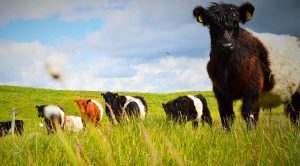What’s so important about Grass Fed Beef?
12th January 2021
 What is the difference between corn-fed and grass-fed beef?
What is the difference between corn-fed and grass-fed beef?
Here at St Marcus, we’re big on meat. But not just any meat, it has to be grass fed. But what’s all the rage about corn fed and grass fed?! Today, we’re going to break it down for you. This sounds like a completely ridiculous label: don’t all cows eat grass? What else would a cow eat?!
Grass-fed beef is important. It’s nutritionally superior, it’s environmentally sustainable and it doesn’t breed antibiotic-resistant bacteria.
There are many different reasons why cows are fed grains:
- It’s profitable for the farmer as grains are more calorie-dense than grass, so they make the cow grow to slaughter weight faster (just like people, cows gain weight fast from eating grains!) This saves the farmer a lot of money, so profits go up.
- It’s cheap for the consumer. The farmer passes down some of the cost savings to you, the person buying steak.
- There’s consumer demand for grain-fed meat. The meat from grain-fed cows is typically quite fatty and very mild-tasting, and people are used to that taste now. Many consumers don’t want the actual taste of beef from a cow that ate grass. They want their beef mild and a bit more… bland.
Nutrition:
All beef is nutritious, but grass-fed beef is significantly more nutritious than grain-fed.
- Grass-fed beef is the only kind of beef that contains conjugated linoleic acid. Grain-fed beef has none. Conjugated linoleic acid is a type of fat that has shown to be very important for preventing weight gain.
- Grass-fed beef has better fat quality. Specifically, it has significantly more anti-inflammatory Omega-3 fats and significantly fewer inflammatory Omega-6 fats. This is something to take with a grain of salt, because the absolute amount of both types of fat is quite low.
- Grass-fed beef has much more vitamin K2. Vitamin K2 is important for heart health and bone health: it helps get calcium into your bones (where it belongs) and not into your arteries (where it causes plaque and heart attacks).
- Grass-fed beef has more antioxidants, especially vitamin E.
Clean Water:
If you don’t want manure in your drinking water, you support grass-fed meat (well, or veganism, but if you’re reading this from St Marcus, you’re probably not a vegan).
Grain-fed meat is unsustainable on water supply. It starts with the fields where we grow the corn that feeds the grain-fed cows: this kind of intensive farming depletes the soil of nutrients. We’re destroying the only place we have to grow our food. So we dump fertilizer on it…but the fertilizer runs off into our lakes and rivers, makes the water unsafe to drink, and damages the habitat of the fish.
The actual farms where grain-fed cows are even more destructive. They live in huge, filthy barns with all the cows cooped up in such a small space, these barns end up with a lot of manure to deal with, often manure full of antibiotic-resistant “superbugs.” And that manure is constantly spilling out into the water supply. This contaminates water and makes it unsafe for the cows to drink, and potentially unhealthy for us to eat that beef.
Grass-fed beef can go a long way towards addressing these problems – there’s obviously no need for huge fields of corn, so the fertilizer problem totally goes away. And since the cows are spread out and not crowded into filthy barns, they don’t need constant antibiotic treatment, so they don’t get antibiotic-resistant superbugs.
So what do you reckon? Are you glad that we only use grass fed beef? Let us know your comments via Social Media!
Facebook Biltong St Marcus
Pinterest @biltongstmarcus
Instagram @biltongstmarcus
#BiltongPeople
